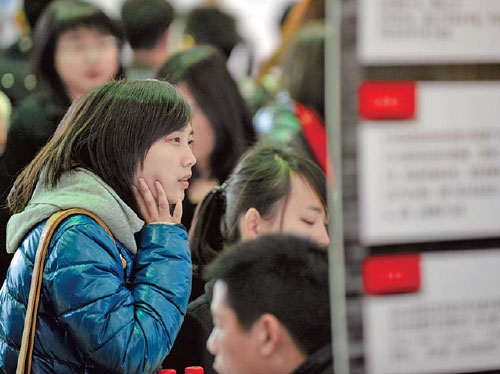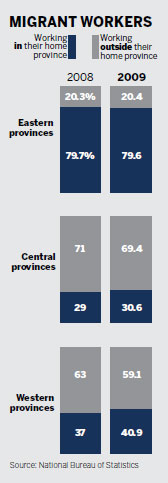Hot issues
Labor crunch 'structural problem'
Updated: 2011-03-09 07:23
By Qian Yanfeng, Duan Yan and Yu Ran (China Daily)
 |
|
A student examines vacancies at a job fair in Hangzhou, capital of Zhejiang province, on Tuesday. More than 6,000 employment openings were displayed at the fair, arranged specifi cally for female students on International Women’s Day. [Photo/Xinhua] |
Worker scarcity is no longer confined to eastern areas, minister says
BEIJING - China's labor shortage is expected to spread to central and western regions, from eastern coastal areas, amid a rising demand for workers, the human resources minister said on Tuesday.
His comments were echoed by Xu Shousheng, governor of Hunan province, traditionally a major source of migrant workers.
"It is not only difficult for eastern coastal areas to recruit workers, we are facing the same problem," Xu said on Tuesday.
"Due to urbanization and industrialization, many local enterprises in Hunan are also recruiting more workers. However, the labor crunch here is less severe," he said.
Apart from seasonal factors - migrant workers return home prior to and during Spring Festival holidays - labor shortages occur as demand rises with economic growth, said Yin.
Increasing numbers of migrant workers choose to work near or at home in the central and western areas as the regional economies develop rapidly, he said. On top of this, the new generation of migrant workers have higher salary and welfare expectations, he added.
After decades of rapid development on the back of a rich reservoir of cheap labor, many labor-intensive industries in the east have relocated to the interior because of rising labor costs. A momentum is gathering that sees migrant workers leaving cities to return to their rural hometowns.
Rising labor costs could see industry relocate and transform the growth pattern, said Yin.

Xu said that more than 12 million people would leave Hunan annually for work, but he estimated that there would be 500,000 to 800,000 fewer people leaving this year.
"If they can find a decent job near home, even if the pay is lower, they'd rather stay near their families," said Xu, adding that he welcomes companies to set up factories in Hunan as long as they "do not pollute".
Xu encouraged skilled migrant workers who have worked in cities like Guangzhou and Shenzhen to come back to start their own enterprises in the province.
The labor shortage will persist during the 12th Five-Year Plan (2011-2015) period as the economy restructures, said Cai Fang, director of the Institute of Population and Labor Economics at the Chinese Academy of Social Sciences, who is also a deputy to the ongoing National People's Congress annual session.
After decades of economic boom on the back of cheap labor and intensive energy use, China wants to make the economy more technology-dependant and boost domestic consumption.
"In the process, we need to step up vocational training for migrant workers so that they can keep up with the industrial restructuring," he added.
Yin said China still has a surplus of labor, with about 8 million people in rural areas and 24 million urban residents waiting to be employed this year, including 14 million college and high school graduates.
He also said that the aging population poses a huge challenge to the pension system.
There are 170 million people over the age of 60, 12.8 percent of the population.
"How to increase pensions has become a problem," he said.
Xinhua contributed to this story.
E-paper

Sindberg leaves lasting legacy
China commemorates Danish hero's courage during Nanjing Massacres.
Crystal Clear
No more tears
Road to the Oscars
Specials

NPC & CPPCC sessions
Lawmakers and political advisers gather in Beijing to discuss major issues.

Sentimental journey
Prince William and Kate Middleton returned to the place where they met and fell in love.

Rent your own island
Zhejiang Province charts plans to lease coastal islands for private investments




